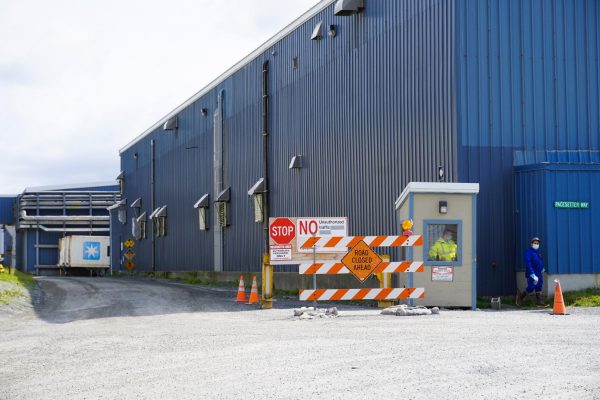
One of world’s largest seafood processing plants remains locked down after 20 more employees tested positive for COVID-19 on Friday, according to company officials.
Unalaska’s largest seafood processing plant, UniSea, tested 475 employees over the past few days after a number of workers tested positive in early January, said UniSea President Tom Enlow.
The original cases were linked to a New Year’s gathering in company housing. With no recent travel or known contacts with infected people, those cases are considered community spread.
“It’s nerve-racking,” Enlow said in an email. “Not knowing how and where the virus is getting introduced will make everyone on edge until we’ve got everyone inoculated and have achieved herd immunity.”
UniSea’s Unalaska processing plant has a year-round workforce, and its facility handles multiple species, from cod to crab. It’s gearing up for one of its busiest times of the year: the winter pollock fishing season, used in fish sandwiches, fish sticks and sushi.
UniSea’s ramp-up for pollock season, which begins Jan. 20, entails flying about 500 workers to Unalaska, Enlow said.
The company has strict protocols to prevent the spread of the virus. Those include a mandatory two-week quarantine after workers arrive in Unalaska, paired with a three-test strategy and daily monitoring.
Despite those measures, UniSea is not a completely closed campus. Many employees have families who do not live on company property, according to Enlow.
“We suspect the virus was brought in from outside the UniSea bubble,” he said.
To ensure the company didn’t miss anyone who might have been exposed to the coronavirus, UniSea leadership chose to test all its employees who are not already in travel quarantine, Enlow said.
Because Unalaska’s clinic has limited testing capacity, the company swabbed its employees and sent the tests to a laboratory in Seattle. UniSea received the results on Friday.
The majority of the workers who tested positive live in two different housing complexes on UniSea’s campus, Enlow said. Both complexes have communal bathrooms.
Enlow said all 20 cases can be traced back to someone from the original group of four who tested positive earlier this month.
“I don’t think there’s a situation with pockets of infected people on campus,” he said. “We can trace it back to the original group.”
With the busy winter pollock season fast approaching, Enlow said the processing company has asked the state for support, including COVID-19 testing supplies and personnel who could help with additional testing, monitoring and contact tracing. He said he’s hoping to have operations up and running for the first pollock delivery after the season opens on Jan. 20.
“It’s a struggle, and we need support,” Enlow said. “But the clinic and the city can only do so much, so we’re asking for the State of Alaska to come in and help.”
As to the financial implications of the shutdown, Enlow said UniSea is lucky the pollock season hasn’t quite started. But it has cost the company money to buy testing supplies and to hire people for tasks like delivering food to the hundreds of plant employees under lockdown.
Under CDC guidelines, employees who have tested negative could go back to work, Enlow said. But UniSea’s leaders aren’t entirely comfortable with that approach.
“We’d rather start continuous surveillance testing before they go back to work,” he said.
The plant processed one load of cod on Jan. 4 and hasn’t taken a delivery since, Enlow said. The company is in communication with its fishing vessels, and will keep them updated about UniSea’s situation, he added.
“Our biggest concern is to contain the spread and not let it get into the community,” he said. “We don’t want to have to shut down again because we didn’t contain everything the first time around.”
In total, 54 people have tested positive for COVID-19 at UniSea since the start of the year, said Enlow. 24 of those cases are considered community-acquired, 30 were identified during their travel quarantine. 44 of those cases are currently active.
Unalaska remains at a high coronavirus risk level.




